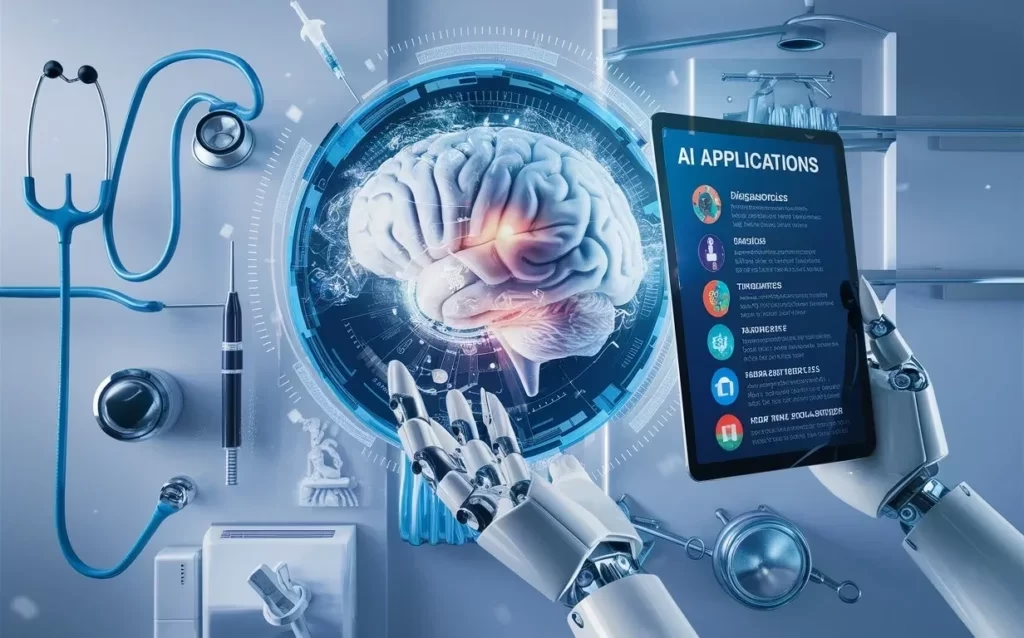Remember that time you had to wait weeks for important medical test results? Or when your doctor had to spend precious minutes of your appointment typing notes instead of talking with you? Those days are rapidly becoming history, thanks to artificial intelligence in healthcare. As someone who’s witnessed the healthcare industry’s evolution firsthand, I can tell you that AI isn’t just changing healthcare – it’s revolutionizing it.
How AI is Transforming Different Areas of Healthcare
Let’s break down the key areas where AI is making the biggest impact:
1. Early Disease Detection and Diagnosis
The early bird catches the worm, and in healthcare, early detection saves lives. AI systems are becoming incredibly accurate at spotting potential health issues before they become serious problems. For instance, companies like Aidoc and CureMetrix are using advanced algorithms to detect abnormalities in medical images with remarkable precision.
I recently spoke with a radiologist who told me, “What used to take 30 minutes to analyze can now be done in under a minute, and we’re catching things we might have missed before.”
2. Personalized Treatment Plans
Remember when medical treatments were one-size-fits-all? Those days are gone. AI platforms like Tempus analyze vast amounts of clinical and molecular data to create personalized cancer treatment plans. This means your treatment is tailored specifically to your genetics, lifestyle, and unique medical history.
3. Operational Efficiency and Resource Management
Healthcare isn’t just about treatment – it’s about managing resources effectively. AI systems are helping hospitals:
- Predict patient admission rates
- Optimize staffing levels
- Manage medical supplies
- Reduce wait times
- Streamline administrative tasks
The Real Benefits: Beyond the Buzzwords
Let’s talk about what this means for you and your healthcare experience:
Faster, More Accurate Diagnoses When IBM Watson Health can analyze thousands of medical papers in minutes to suggest treatment options, your doctor has more time to focus on what matters most – you.
Reduced Healthcare Costs While implementing AI requires an initial investment, the long-term savings are substantial. Automated processes, fewer errors, and more efficient resource management all contribute to lower healthcare costs.
Improved Patient Experience Imagine having a virtual health assistant that’s available 24/7. Companies like Babylon Health are making this a reality, providing AI-powered health assessments whenever you need them.
Addressing the Elephant in the Room: Safety and Ethics
Let’s be honest – whenever we talk about AI in healthcare, questions about safety and ethics come up. Here’s what you need to know:
| Concern | How It’s Addressed |
|---|---|
| Data Privacy | HIPAA-compliant encryption and secure storage systems |
| AI Accuracy | Rigorous testing and human oversight |
| Ethical Use | Strong regulatory frameworks and guidelines |
| Bias Prevention | Diverse training data and regular algorithm audits |
Implementation: How Healthcare Providers Are Making the Switch
The transition to AI-powered healthcare isn’t happening overnight. Healthcare providers are taking a careful, measured approach:
- Starting with specific, high-impact areas
- Training staff thoroughly
- Measuring outcomes carefully
- Gradually expanding AI applications
The Future of Healthcare AI: What’s Next?
The future of AI in healthcare is incredibly exciting. We’re seeing developments in:
Predictive Healthcare Imagine your smartwatch detecting potential health issues before you feel any symptoms. Companies like GRAIL are already working on early detection technologies that could revolutionize preventive care.
Enhanced Telemedicine The combination of AI and telemedicine is making healthcare more accessible than ever. Platforms like Wellframe are showing us how AI can support chronic disease management remotely.
Advanced Drug Discovery AI is accelerating the development of new medications, potentially bringing life-saving drugs to market years faster than traditional methods.
Taking Action: What This Means for You
As we wrap up, you might be wondering how to make the most of these advances in healthcare AI. Here are some practical steps:
- Ask your healthcare provider about AI-powered diagnostic tools they’re using
- Consider using AI-powered health monitoring apps
- Stay informed about new developments in healthcare AI
- Participate in discussions about healthcare AI ethics and privacy
Your Role in the AI Healthcare Revolution
Remember, you’re not just a passive observer in this transformation—you’re an active participant. Your feedback, experiences, and engagement with these new technologies help shape their development and implementation.
Conclusion: Embracing the Future of Healthcare
The integration of AI in healthcare isn’t just about adding new technology – it’s about fundamentally improving how we prevent, diagnose, and treat health conditions. As these systems become more sophisticated and widespread, we’re moving toward a future where healthcare is more personalized, efficient, and accessible than ever before.
Want to learn more about how AI is transforming healthcare? Talk to your healthcare provider about the AI tools they’re using, and stay tuned for more developments in this rapidly evolving field.



